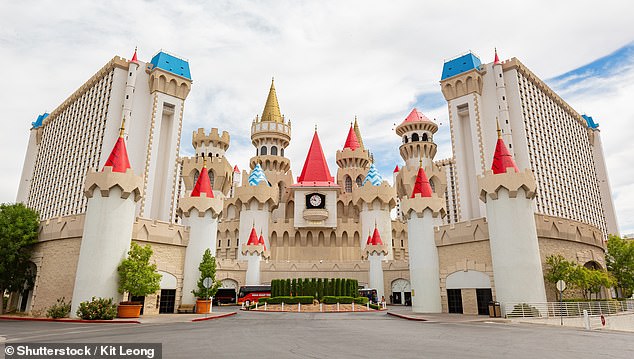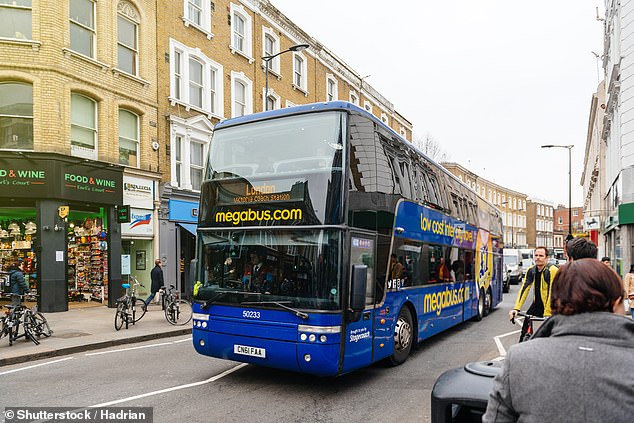Explosive Study Exposes Travel Companies Ignoring Rules on Hidden Add-On Costs — Could Be Breaking the Law
- EXPLORE FURTHER: As a travel editor, here’s what I ALWAYS bring with me
We all know how frustrating shopping for flights and holidays online can sometimes be.
You’re reeled in by a very low price – and then end up with a much bigger figure by the time you get to the check-out, thanks to extra admin and booking fees.
The Digital Markets, Competition and Consumers (DMCC) Act – a new legislation enacted in April – aimed to eliminate those annoying additional fees.
However, in a fresh inquiry, Which? has discovered that several prominent travel companies like Megabus, Wowcher, and LoveHolidays might be flouting regulations by neglecting or delaying compliance with the updated laws.
In the most extreme cases, travellers could find themselves paying hundreds of pounds more than the upfront price.
When examining the process of reserving a stay at a hotel resort through comparison websites like Kayak and Trivago, Which? discovered significant discrepancies in pricing among different offers, even for accommodations such as the Excalibur Hotel. Las Vegas .
Experts from Which? discovered that a seven-day trip in July costs only £371 with loveholiday, whereas Booking.com and Hotels.com quoted approximately £700 for the same duration.
Lovesholidays stated that their price covers both hotel fees and the local tourist tax.

When Which? reached out to loveholidays, the company acknowledged that the quoted price didn’t cover the entire hotel fees, unlike what Booking.com and Hotels.com factored in.
Instead, an astonishing £257 additional fee awaited upon checkout.
Excalibur, similar to numerous hotels in Las Vegas and many across the United States and the Caribbean, imposes a 'resort fee'—a compulsory charge for amenities you might or might not utilize.
This lets them showcase a upfront payment price, followed by an additional significant amount when you depart.
This practice is legally permissible—despite significant criticism even in the US—but according to the new DMCC Act, websites targeting the UK must inform customers about these charges upfront.
Which? reports that following contact from the consumer advocate in February, LoveHolidays made minor adjustments to their listing. They removed the assertion that their price covers all hotel fees and added the clarification: “Depending on your hotel’s policy, you might still have to pay extra charges.”
Which? also states that LoveHolidays asserted it would guarantee compliance with upcoming regulations before they took effect; however, when the consumer advocate group verified in May, they claim these measures were yet to be implemented.
It states: 'In contrast to numerous competitors, it failed to display the resort fee for the Excalibur.'

Loveholidays' listing currently states: "Your hotel might impose extra charges, payable on-site," yet it fails to disclose that these mandatory fees can increase your accommodation costs by several hundred pounds.
When Which? reached out to loveholidays once more, the travel website reportedly declined to comment but indicated it was considering including resort fees in its pricing.
As long as this continues, Which? claims the firm is violating the law.
Experts from Which? further explain: "A number of lesser-known websites also fail to mention resort fees; however, many major platforms such as Booking.com, Expedia, Hotels.com, and Lastminute.com do incorporate these charges."
When looking into holiday deals on the discount site Wowcher, Which? discovered a comparable issue.
A one-week summer break to Malta was originally quoted at £1,278 but included an unexpected £9.99 'administrative charge' when finalizing the booking.
In February, Wowcher informed Which? that they were examining their administrative fee practices and ensuring compliance with all relevant laws moving forward.
Nevertheless, as of May, Wowcher was still levying a £9.99 administration fee, reports Which?.

At the same time, when Which? investigated budget coach operator Megabus, they too uncovered problems.
The experts initially found a one-way ticket from London to Birmingham for a bargain £5.99 on the Megabus website, only to be hit with an extra £1.50 booking fee at checkout – putting the price up by 25 per cent to £7.49.
Megabus told Which? in February that it would comply with any new regulation.
When Which? revisited the site in May to check for a trip on the Megabus.co.uk platform, they found that a £1.50 booking fee was still prominently displayed right before completing the transaction.
The experts from Which? also state: 'The charge isn’t disclosed at any point during the buying process on the website prior.'
On the National Express site, they have a notice stating that the advertised price doesn’t include a £1.50 reservation charge. This is more transparent compared to Megabus.
Megabus informed Which? that they are 'dedicated to providing clear and budget-friendly journeys,' and they plan to revise their pricing structure so that booking fees will be prominently displayed from the beginning of the reservation process by late May 2025.
Under the DMCC Act, the Competition and Markets Authority (CMA) has the authority to impose penalties of up to £300,000 or 10 percent of global revenue—whichever amount is greater—without needing to pursue legal action in court.

Trading Standards has the authority to implement the regulations as well.
In the first 12 months of its enforcement the CMA has said that it will prioritise clear infringements of the law and practices that are particularly harmful to consumers.
This encompasses 'costs that remain concealed until much later in the purchasing process,' along with various other problems.
Which? thinks that travel companies continue to use questionable additional charges to extract extra cash from their clients, potentially breaking the law.
Rory Boland, the Editor at Which? Travel, commented: "Hidden charges and additional costs can greatly alter the ultimate amount individuals end up paying for their vacations. In some instances, the discrepancy between the initial quoted price and what consumers actually have to pay could be as high as several hundred pounds."
‘We’ve uncovered examples of brands ignoring new rules that are there to protect customers from being hit with unexpected fees and we believe they could be breaking the law.’
In response to Which?’s study, Megabus said: ‘We are committed to offering transparent and affordable travel for our customers.
‘We are currently making updates to our website - due to be completed by the end of this month - to ensure that all fees, including our £1.50 booking fee, are clearly highlighted at the start of the booking process.

‘We fully support efforts to improve transparency in pricing across the travel industry and will continue to ensure our practices align with the latest regulations.’
'Wowcher has made several alterations to its website to guarantee adherence to the DMCC Act.'
This has involved offering an estimation of its varying administrative fees within its price breakdown, displayed visibly and prominently on our deal pages before customers proceed to checkout.
'We aim to make our website straightforward and open for customers, enabling them to confidently make purchasing choices on the Wowcher platform.'
Read more
Post a Comment for "Explosive Study Exposes Travel Companies Ignoring Rules on Hidden Add-On Costs — Could Be Breaking the Law"